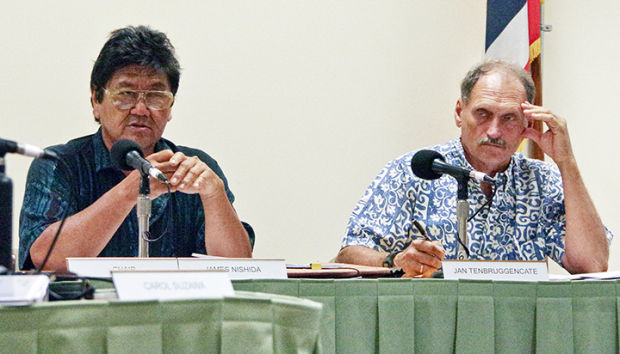LIHUE — The number of petition signatures required to place public measures on general election ballots will remain the same: Twenty percent of registered voters for referendums and initiatives, 5 percent for charter amendments.
On Monday, the County of Kauai Charter Review Commission discussed, and voted down, two proposed amendments that some say would have brought balance to bringing forward public measures.
The first, which would have reduced the number of signatures for initiatives and referendums from 20 to 5 percent, failed by a 3-3 vote. Commission Chair James Nishida Jr., Vice Chair Jan TenBruggencate and Commissioner Carol Suzawa voted against the reduction.
While he supports the idea of lowering the standard for those two types of measures, TenBruggencate said 5 percent was simply too low.
“It would be by far the lowest number in the state,” he said, adding 10 percent would be preferable.
An initiative, according to the charter, is “the power of voters to propose ordinances” in the elections process. Referendums are defined as “the power of the voters to approve or reject ordinances that have been passed by the County Council.”
In April, TenBruggencate introduced the initial proposal, aimed at quadrupling the number of signatures required to petition to the Kauai County Charter from 5 to 20 percent. He said changing the charter — the basic organizational document of county government — should be harder, or equally as hard, as passing a law.
“If we, on a regular basis, put things on the charter using a process that looks easier, and we end up putting — as we have on two occasions — something … that is legally flawed, it costs this community hundreds of thousands of dollars,” he said. “It costs us untold amounts of time.”
The proposed increase, however, also failed Monday by a 3-3 vote, with commissioners Ed Justus, Joel Guy and Patrick Stack voting against.
Repeating previous statements, Justus said he could not understand how the increase for charter amendments would prove worthwhile, even if the commission approved it, sending it to a public vote.
“I would be shocked if the public decided, ‘I’m going to make it really difficult on myself (to change government),’” he said.
Instead of “toying with the numbers,” which he said would do nothing to solve the problem of legally flawed proposals, Justus voiced support for defining what a charter amendment is.
Several people testified during the meeting, many bringing up a citizen initiative by Kauai Rising aimed at regulating the GMO industry on Kauai.
Kauai resident Allan Parachini said the Kauai County Charter currently invites abuse, a perfect example being the Kauai Rising initiative, which he believes is an ordinance masked as a charter amendment because of the smaller number of signatures required.
“It should be harder to amend the charter than it is to qualify an initiative ordinance, or at least as difficult,” he said.
Stack said he believes the commission’s job is simple — tinkering with and identifying necessary changes to the charter.
“We’re muddying the waters. We’re clouding the issue by mixing GMOs, pesticides and our job here,” he said.
In Stack’s mind, 5 percent was too high. He voiced support for going as low as 1 percent.
“If somebody has an issue, let’s talk about it, let’s get it on the ballot,” he said. “That’s our job.”




